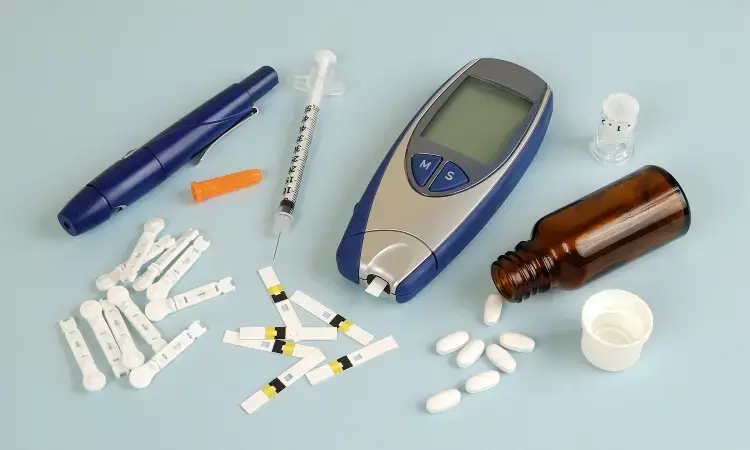- Home
- Medical news & Guidelines
- Anesthesiology
- Cardiology and CTVS
- Critical Care
- Dentistry
- Dermatology
- Diabetes and Endocrinology
- ENT
- Gastroenterology
- Medicine
- Nephrology
- Neurology
- Obstretics-Gynaecology
- Oncology
- Ophthalmology
- Orthopaedics
- Pediatrics-Neonatology
- Psychiatry
- Pulmonology
- Radiology
- Surgery
- Urology
- Laboratory Medicine
- Diet
- Nursing
- Paramedical
- Physiotherapy
- Health news
- Fact Check
- Bone Health Fact Check
- Brain Health Fact Check
- Cancer Related Fact Check
- Child Care Fact Check
- Dental and oral health fact check
- Diabetes and metabolic health fact check
- Diet and Nutrition Fact Check
- Eye and ENT Care Fact Check
- Fitness fact check
- Gut health fact check
- Heart health fact check
- Kidney health fact check
- Medical education fact check
- Men's health fact check
- Respiratory fact check
- Skin and hair care fact check
- Vaccine and Immunization fact check
- Women's health fact check
- AYUSH
- State News
- Andaman and Nicobar Islands
- Andhra Pradesh
- Arunachal Pradesh
- Assam
- Bihar
- Chandigarh
- Chattisgarh
- Dadra and Nagar Haveli
- Daman and Diu
- Delhi
- Goa
- Gujarat
- Haryana
- Himachal Pradesh
- Jammu & Kashmir
- Jharkhand
- Karnataka
- Kerala
- Ladakh
- Lakshadweep
- Madhya Pradesh
- Maharashtra
- Manipur
- Meghalaya
- Mizoram
- Nagaland
- Odisha
- Puducherry
- Punjab
- Rajasthan
- Sikkim
- Tamil Nadu
- Telangana
- Tripura
- Uttar Pradesh
- Uttrakhand
- West Bengal
- Medical Education
- Industry
Tirzepatide, potential new treatment for inadequately controlled type 2 diabetes patients: Lancet

Japan: New research shows tirzepatide to be a potential new treatment option for type 2 diabetes that is not controlled well with a single oral antihyperglycaemic medication.
The study, published in The Lancet Diabetes & Endocrinology, found that the addition of tirzepatide to oral antihyperglycaemic monotherapy in patients with type 2 diabetes was well-tolerated and led to improvement in bodyweight and glycemic control, regardless of background oral antihyperglycaemic medication.
In Japanese patients, new therapeutics need to be evaluated due to potential ethnic differences in the pathophysiology of type 2 diabetes. Rina Chin, Eli Lilly Japan, Tokyo, Japan, and colleagues, therefore, aimed to assess the safety and glycaemic efficacy of tirzepatide as an add-on treatment in Japanese patients with type 2 diabetes who had inadequate glycaemic control with stable doses of various oral antihyperglycaemic monotherapies in a multicentre, open-label, parallel-group, randomized, phase 3 trial.
The trial was conducted across 34 medical research centers and hospitals in Japan. The study included patients aged 20 years or older with inadequately controlled (HbA1c ≥7·0% to <11·0%) type 2 diabetes and was receiving oral antihyperglycaemic monotherapy (sulfonylureas, biguanides, thiazolidinedione, α-glucosidase inhibitors, glinides, or SGLT2 inhibitors) for at least 3 months (stable dose for ≥8 weeks before screening), had a BMI of 23 kg/m2 or higher, and stable bodyweight (±5%) for at least 3 months before screening.
They were randomized in the ratio of 1:1:1 to receive 5, 10, or 15 mg of tirzepatide administered once per week subcutaneously for 52 weeks followed by a 4-week safety follow-up period. All patients started receiving 2·5 mg tirzepatide and doses were escalated by 2·5 mg every 4 weeks until the assigned dose was reached.
During 52 weeks of treatment, safety and tolerability assessed as the incidence of treatment-emergent adverse events in the modified intention-to-treat (mITT) population was the primary endpoint of the study.
484 participants were assessed for eligibility and 443 were randomly assigned to receive at least one dose of tirzepatide (148 [33%] in the 5 mg group, 147 [33%] in the 10 mg group, and 148 [33%] in the 15 mg group) between March 30, 2019, and Feb 16, 2021, with recruitment and enrolment continuing until Feb 4, 2020. 398 (90%) participants completed the study and treatment.
The researchers reported the following findings:
- Most participants (343 of 443) had at least one treatment-emergent adverse event.
- Treatment-emergent adverse events were more frequent in the tirzepatide 15 mg group (125 of 148) than in the 5 mg (109 of 148) and 10 mg groups (109 of 147).
- The most frequent treatment-emergent adverse events with tirzepatide were mild or moderate nasopharyngitis (17%), nausea (17%), constipation (12%), diarrhea (12%), and decreased appetite (10%).
- At week 52, mean changes from baseline in body weight were –3·8 kg in the 5 mg group, –7·5 kg in the 10 mg group, and –10·2 kg in the 15 mg group.
- Least squares mean HbA1c at baseline reduced from 8·5% to 6·0% in the 5 mg tirzepatide group, from 8·6% to 5·6% in the 10 mg group, and from 8·6% to 5·6% in the 15 mg group at week 52. No adjudication-confirmed deaths were reported.
The researchers concluded, "Tirzepatide is a potential new treatment option for Japanese patients with type 2 diabetes that is inadequately controlled with single oral antihyperglycaemic medication."
Reference:
The study titled, "Safety and efficacy of tirzepatide as an add-on to single oral antihyperglycaemic medication in patients with type 2 diabetes in Japan (SURPASS J-combo): a multicentre, randomised, open-label, parallel-group, phase 3 trial," was published in The Lancet Diabetes & Endocrinology.
DOI: https://doi.org/10.1016/S2213-8587(22)00187-5
Dr Kamal Kant Kohli-MBBS, DTCD- a chest specialist with more than 30 years of practice and a flair for writing clinical articles, Dr Kamal Kant Kohli joined Medical Dialogues as a Chief Editor of Medical News. Besides writing articles, as an editor, he proofreads and verifies all the medical content published on Medical Dialogues including those coming from journals, studies,medical conferences,guidelines etc. Email: drkohli@medicaldialogues.in. Contact no. 011-43720751


